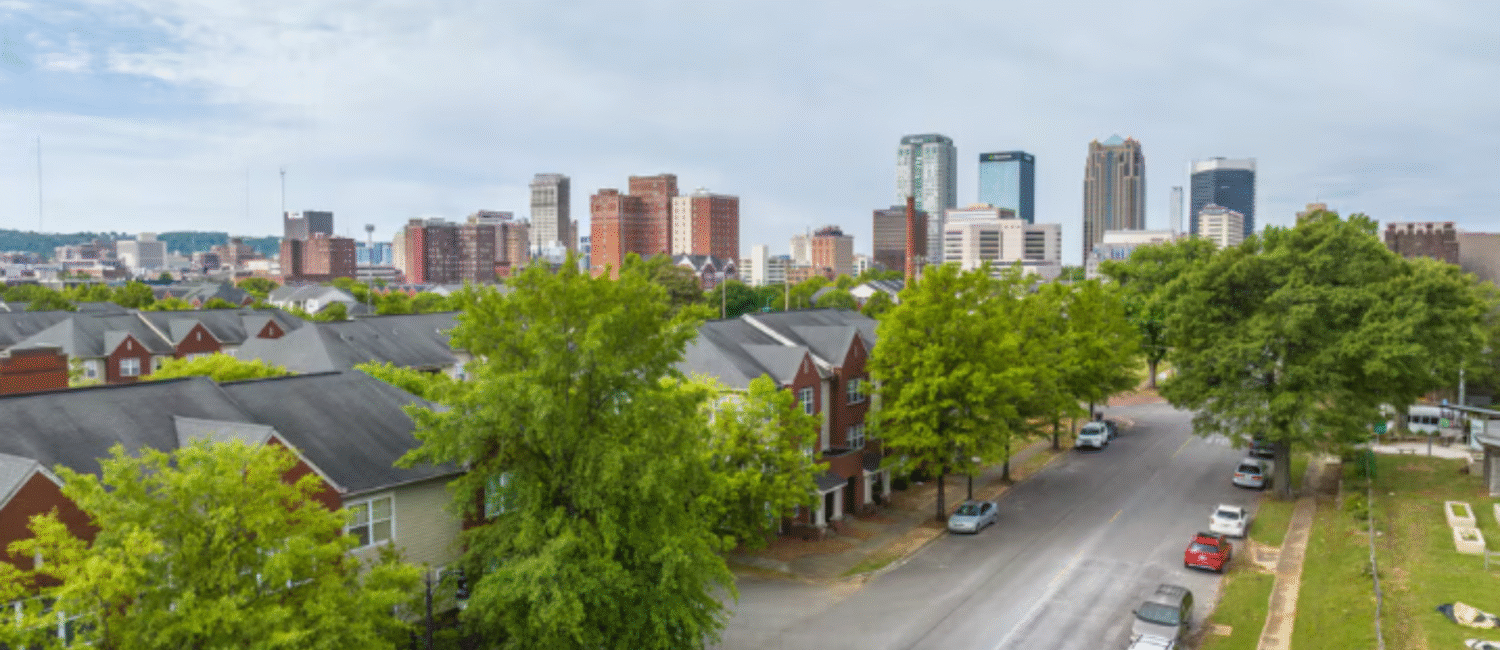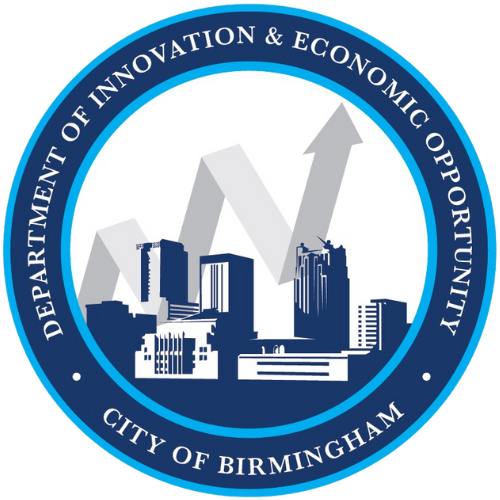
Frequently Asked Questions
B.O.L.D. Program Frequently Asked Questions
Is there information on the impact of the BOLD funding program and the work of previous BOLD awardees?
Yes. The City of Birmingham is pleased to share the 5-year impact report of the BOLD funding program. You can access the report here.
Does IEO have a definition of inclusive development?
The City of Birmingham is committed to continuing to build a fairer, more equitable, and inclusive Birmingham. Birmingham has always been at the vanguard of human rights, and that history extends to the City of Birmingham’s posture toward every community in Birmingham – and particularly the communities that are the most vulnerable and historically marginalized, such as women, people with disabilities, and Black, LGBTQ, homeless, and justice-involved Birmingham residents. As a result, the City of Birmingham, as a matter of public policy, encourages the participation, access, and service of minority-, women-, and disadvantaged business enterprises (MWDBEs) and communities to the maximum extent possible.
The Department of Innovation and Economic Opportunity (IEO) shares this vision in our pursuit of a resilient and inclusive economy in Birmingham. Informed by Nobel Prize winning economist and philosopher Amartya Sen, IEO sees development as the removal of major sources on unfreedom: poverty as well as tyranny, poor economic opportunities as well as systemic deprivation, neglect of public facilities as well as intolerance or overactivity of repressive governments. This means that development in general, and economic development in particular, starts by recognizing that some populations have been marginalized and “unfree” throughout history. IEO sets and tracks goals for supporting these communities and advancing an inclusive economy, reflecting a commitment to intergenerational and social mobility, equity-driven human capital formation and strategic investments for innovation and productivity. Through the Office of Business Diversity and Opportunity, IEO also engages in place-based development to grow small business; support minority-, women-led, and disadvantaged business enterprises (MWDBEs); and spur neighborhood investment to ensure inclusive growth in Birmingham.
Can I apply if my organization is currently receiving BOLD funding and/or other City of Birmingham funding, or if my organization has in the past?
Yes. Organizations that currently receive or have received BOLD funding or other City of Birmingham funding are eligible to apply. However, BOLD is intended to encourage new ideas, ensure wide impact across Birmingham’s diverse organizations, and foster investment in organizations for which a small amount of funding can allow organizations to scale and create a larger impact. Therefore, organizations that do not currently receive funding from City of Birmingham sources may be considered more competitive in the application process. It is also important to note that the specific project that is proposed for BOLD funding cannot be supported by other City funding sources (i.e. the budget narrative for the proposal should not include other City of Birmingham funding sources).
Additionally, new BOLD awardees may be considered more competitive in the application process. If applicants have received BOLD funding previously, applicants are encouraged to demonstrate in their proposals any new and innovative ideas that build on previous BOLD programming to demonstrate how they will better serve Birmingham residents with more BOLD funding.
Are there any limitations towards the use of funds in regards to programmatic costs versus operational costs?
The BOLD funding program is intended to support programs, projects, and services that advance one or more BOLD objectives in Birmingham communities and that support Birmingham residents as directly as possible. It is also intended to support programs that are sustainable beyond the BOLD performance period. Therefore, proposals that utilize the majority (60% or more) of the funding request to support programming and direct services to Birmingham residents, rather that staff and operational costs, may be considered more competitive.
Can I apply if my project doesn’t align with an objective?
Objectives #4 and #6 are the broadest in nature, aimed at surfacing community needs and new solutions for addressing them. These categories are a good fit for proposals that do not fit clearly within other objectives. But remember: projects must provide programming and/or services to Birmingham residents that address barriers to economic opportunity and social mobility. Additionally, organizational track record and community impact related to the selected objective will be considered when reviewing applications.
Can I select multiple objectives if my program aims to accomplish more than one?
Yes. However, keep in mind that competitive proposals will demonstrate a clear focus on and track record in each objective selected. Therefore, applicants are encouraged to only select the objective(s) for which they can demonstrate clear focus and track record.
Can I select multiple geographic priority areas if my program aims to accomplish more than one?
Yes. However, keep in mind that competitive proposals will demonstrate a clear focus on and track record in each geographic priority area selected. Therefore, applicants are encouraged to only select the geographic priority area(s) for which they can demonstrate clear track record and a plan for intentional impact. Applicants are discouraged from selecting all geographic priority areas, even if proposals are generally open to all of Birmingham, unless applicants have a specific plan for reaching and track record of serving every geographic priority area.
What is considered “leveraged funding”?
“Leveraged” funds are simply a financial commitment toward the overall project budget from a source other than the awarding organization (I.e. the City of Birmingham). Leveraging can be achieved by a commitment from the applicant or through various partnerships, public or private. However, leveraged funds cannot be sourced from other City of Birmingham funding.
The required leveraged funding for the BOLD funding program is 20% or more of the entire project budget (NOT the BOLD funding request amount). For example, if a proposal’s entire project budget is $250,000, the application may seek up to $200,000 from BOLD and should clearly indicate in the budget narrative how it will provide $50,000 toward the project objectives. Proposals that do not meet the 20% leveraged funding requirement of the entire project budget will not be eligible for consideration.
Eligible leveraged funding can be in the form of cash, in-kind, or donated materials. Construction costs can count toward the overall leveraged costs. IEO will accept technical platforms as a leveraged resource. Existing staff salaries can count toward leveraged funding if a portion of their work is allocated to the proposed BOLD project and if the organization pays the employee with funds that are specifically used to run the proposed program. IEO will also accept the quantified value of volunteer hours to the project. However, all leveraged funding for a proposal cannot be exclusively through personnel costs, overhead costs, or volunteer hours.
What types of resources are not allowable as leverage?
The purchase of facilities or buildings are unallowable as leverage. The donation of a building or property as a third party in-kind contribution is unallowable as leverage. Funding from other City of Birmingham sources is unallowable as leveraged funding.
If you have multiple companies, can you apply with three separate companies?
Yes, you can propose multiple projects for BOLD funding from one organization and/or a single proprietor with multiple organizations – so long as the activities and goals associated with the proposed projects are distinct from each other. Consideration of BOLD funding allocation is based on the eligibility of the organization and the quality of the proposal(s)
Can startups apply?
Yes, startups are encouraged to apply. It is important to note that track record, fiscal sustainability, and organizational capacity to execute the proposed project are considered in the BOLD application review process, however. Startups are encouraged to particularly emphasize these aspects of their projects, where applicable, therefore, even if these aspects are demonstrated creatively (e.g. track record at the staff level, rather than at the organizational level).
Can new non-profits apply?
Yes, new non-profits are encouraged to apply. It is important to note that track record, fiscal sustainability, and organizational capacity to execute the proposed project are considered in the BOLD application review process, however. New organizations are encouraged to particularly emphasize these aspects of their projects, where applicable, therefore, even if these aspects are demonstrated creatively (e.g. track record at the staff level, rather than at the organizational level).
Can a non-profit start a new project in one of the geographic priority areas?
Yes, an organization can propose a new project in one of the geographic priority areas. It is important to note that previous track record and engagement with the geographic priority area will be considered, however, including the location of the organization, staff experience in the locale, civic engagement, and a history of success with the community that projects propose to serve. This can be demonstrated by the lead applicant and/or project partnerships.
Department of Innovation and Economic Opportunity
710 North 20th Street, 4th Floor • Birmingham, AL 35203
Phone: (205) 254-2799 • Fax: (205) 254-7741
Email: ieo@birminghamal.gov
Monday – Friday, 8:00 am – 5:00 pm

